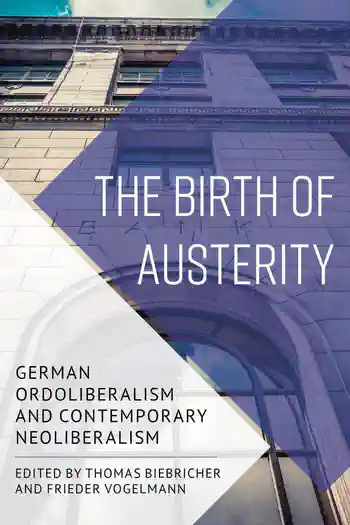 Cover of The Birth of Austerity
Cover of The Birth of AusterityThe Birth of Austerity. German Ordoliberalism and Contemporary Neoliberalism
London: Rowman & Littlefield International (2017). 2017Abstract
Ordoliberalism and the ‘Freiburg School’ have gained traction in contemporary political economy in response to two factors: a rising interest in governmentality studies and the banking, financial and sovereign debt crisis in Europe. In the face of these crises, Germany has assumed a position of quasi-hegemony in the European Union, making decisions about bailouts, the politics of crisis management and the rise of austerity.
This volume gathers together English translations of seminal ordoliberal texts by thinkers ranging from Walter Eucken to Franz Böhm, Alexander Rüstow and Hans Grossmann-Doerth. Offering some foundational insights into ordoliberalism, these essays give insight into a field that is much misunderstood outside Germany. The second half of the book comprises of analyses of contemporary issues in light of ordoliberal thought, showing how its ideas endure and relate directly to austerity policy across Europe.
Reviews
Fèvre, Raphaël (2019): The Birth of Austerity. German Ordoliberalism and Contemporary Neoliberalism (Review). In: The European Journal of the History of Economic Thought 26.1, 206–209. DOI: 10.1080/09672567.2019.1601818
Table of Contents
Introduction
Part I: Sources
The Ordo Manifesto of 1936 Walter Eucken, Franz Böhm and Hans Grossmann-Doerth
Structural Transformations of the State and the Crisis of Capitalism Walter Eucken
The Different Types of Economic System Walter Eucken
Competition as the Basic Principle of the Economic Constitution Walter Eucken
Principles of Economic Policy Walter Eucken
Economic Ordering as a Problem of Economic Policy and a Problem of the Economic Constitution Franz Böhm
Decartelization and De-concentration: A Problem for Specialists or a fateful Question? Franz Böhm
State Policy and the Necessary Conditions for Economic Liberalism Alexander Rüstow
General Sociological Causes of the Economic Disintegration and Possibilities of Reconstruction Alexander Rüstow
Social Policy or Vitalpolitik (Organic Policy) Alexander Rüstow
Part II: Analyses
Ordoliberalism as Governmentality Johanna Oksala
Europe after Ordoliberalism: A Philippic Christian Joerges
Is Germany’s and Europe’s Crisis Politics Ordoliberal and/or Neoliberal? Brigitte Young
Economic Order and Political Intervention. Michel Foucault on Ordoliberalism and its Governmental Rationality Lars Gertenbach